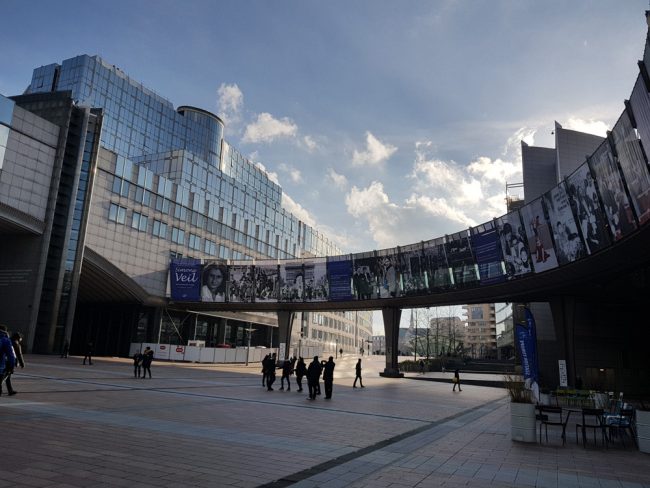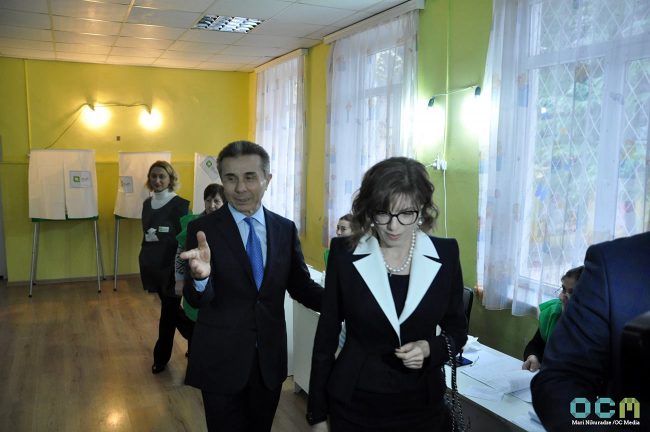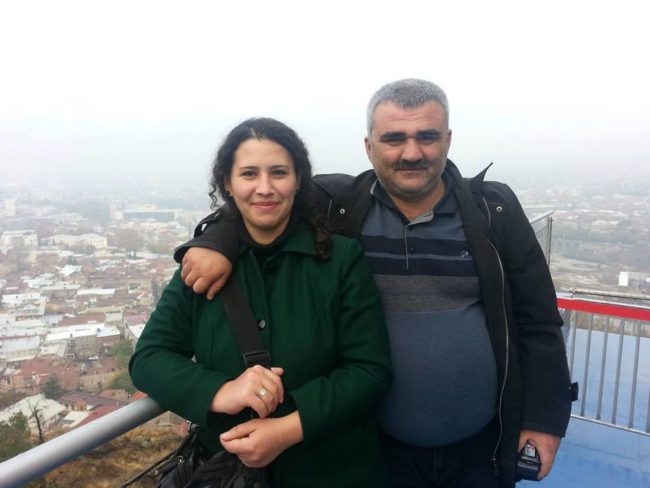

The European Parliament has expressed concerns over high-level corruption, human rights protection, labour safety, judicial independence, and more in Georgia in a report on the implementation of the country’s EU Association Agreement. Despite criticisms, the report’s summary said overall assessment of the implementation process was positive.
The report, which was passed by the EU parliament 528 votes to 97 on Wednesday, assessed Georgia’s progress in implementing the deal.
The Association Agreement (AA) was signed in 2014 and came into force in 2016; it aims to align Georgian legislation with EU laws, providing directives in a wide range of fields.
The report suggested a lack of skilled staff in government institutions, urging the authorities ‘to guarantee that the structural units dealing with European integration issues in all the ministries are equipped with a sufficient number of specifically qualified officials’.
The report called for more ‘high-level political oversight’ of the agreement’s implementation, including ‘stronger involvement of the Prime Minister and the Minister for Foreign Affairs’.
Elite corruption
The report said that high-level elite corruption remained a serious issue in Georgia, despite acknowledging Georgia’s progress in fighting low and mid-level corruption, leading to a good regional ranking in corruption perception indexes.
The EU Parliament called on Georgia to implement the AntiCorruption Strategy and its Action Plan and said it must ensure that the Anti-Corruption Agency was independent — free of any political interference and separated from the State Security Service.
The European Parliament reiterated ‘the importance of an effective separation of powers and a clear dissociation between politics and economic interests, and stresses that fighting corruption requires an independent judiciary and a solid track record of investigations into high-level cases of corruption, yet to be established’.
The report came in light of a scandal over secret recordings in Georgia suggesting a racket in the Georgian government.
Audio files published by opposition-leaning TV Channel Rustavi 2 in September featured former sports minister Levan Kipiani allegedly attempting to extort expensive cars for other ministers from Omega Group, a business group that owns local TV channel Iberia TV.
Several recordings were released, suggesting the government was applying pressure on businesses.
[Read more about racket allegations in Georgian Government on OC Media: Analysis | Georgia’s tapes scandals suggest something is rotten at the top of Georgian politics]

The report also emphasised the role of the opposition in a parliamentary system as well as ‘the urgent need to put in place more rigorous mechanisms for scrutinising the executive, including through the ability of Members of Parliament to put questions to ministers and the Prime Minister on a regular basis in order to hold them accountable’.
Human Rights
In the report, the EU Parliament expressed concern ‘over the lack of progress in the investigation of the abduction of Azerbaijani journalist Afgan Mukhtarli from Tbilisi, which revealed many shortcomings as regards the functioning of the security services, including partypolitical interference’.
It called on the Georgian Government to deliver a prompt and credible conclusion to the investigation and underscored the need for Georgia to ensure a safe and secure environment for human rights defenders residing in Georgia to ensure such incidents did not happen again.
Mukhtarli was last seen in Tbilisi on 29 May 2017 on his way home after meeting a friend in a local café. He resurfaced jailed in Azerbaijan the next day.
According to his lawyers, Mukhtarli was kidnapped by four Georgian-speaking men, three of them wearing police uniforms, who planted money in his pocket as they took him across the Georgian-Azerbaijani border.

Mukhtarli was charged by the authorities in Azerbaijan with smuggling €10,000 in cash, illegal border crossing, and resisting police, eventually being sentenced to six years imprisonment.
[Read more about Mukhtarli’s abduction on OC Media: Activists mark 1 year since kidnapping of Azerbaijani journalist Mukhtarli in Tbilisi]
The report pointed to shortcomings in the protection of fundamental freedoms and human rights, notably for vulnerable groups, and said the authorities should overcome this by fighting hate speech and discrimination against queer people, Roma, people living with HIV/AIDS, people with disabilities, and other minorities.
‘[The EU Parliament] calls on the Georgian authorities to take further steps to protect women against all forms of violence, sexual abuse and harassment at work and in public places, and to increase the number of women on the labour market and in politics where they remain underrepresented’.
In the evening of 14 November, the Georgian Interior Ministry published statistics on femicide, stressing that it had dropped by 58% compared to last year. It also said that in 2018 no cases of a husband killing his wife had been recorded.
Labour safety
The report welcomed the adoption of the law on occupational safety ‘to effectively tackle the dramatic human toll of incidents at work’ and urged the Georgian Parliament to broaden the scope of the law to avoid exemptions.
[In pictures | Georgia’s deadly construction sites]
It reminded the Georgian authorities of the obligation to respect international labour rights standards and stressed the need to transform the Labour Conditions Inspection Department into a fully-fledged and independent labour inspection system aligned with the International Labour Organisation’s convention to improve safety.
On 7 March the Georgian Parliament adopted a new labour safety law which will come into force in 2019. It includes an obligation for employers to provide accident insurance for employees and to establish an office or appoint a specialist to oversee labour safety.
The law also mandates companies ‘with high-risk workplaces’ to re-register in the registry of economic activities. Parliament’s Healthcare and Social Issues Committee, which gave the green light to the amended version of the bill in February, has defined 11 hazardous sectors in which companies will be required to register.

Parliament started considering the bill in June 2017 following the death of four miners in a coal shaft in Tkibuli. Data obtained by OC Media from the Ministry of Internal Affairs showed that in 2010–2017, 359 people were killed and 984 injured in workplace accidents.
[Read more about Georgia’s Labour Safety Law on OC Media: Georgia’s parliament adopts labour safety law]
Worthy of praise or criticism?
The report also highlighted the EU’s concerns over a number of other issues raised for years by Georgian civil society, such as the independence of the judiciary, effective investigation mechanisms for investigating human rights violations by law enforcement officers, pressure being exerted by Turkey on Turkish residents and education institutions in Georgia due to their alleged affiliation to the Gülen movement, and more.
[Read more about developments around the Black Sea University on OC Media: Georgian ‘Gülen-connected’ university banned from taking in new students]
Responding to the report, Georgian officials focused on the positive assessments in the report.
The first deputy chairperson of the Georgian Parliament, Tamar Chugoshvili, said the EU Parliament had named Georgia the region’s superstar in terms of European integration.
‘The European Parliament provides a very positive assessment of the implementation of the Association Agreement and the steps taken by Georgia in the process of European integration’, said Chugoshvili.
She said Georgia was not a perfect country and that there were numerous challenges cited in the report ‘some of which we may take into consideration, some of them not’. But she said this was a secondary issue, as what matters was that the EU provided a positive assessment overall.
Georgian Prime Minister Mamuka Bakhtadze also reiterated the progress mentioned in the report and said that ‘the report cites Georgia as a role model in cooperation with EU’.
While the report was highly critical of corruption in Georgia, in his speech on 14 November, Bakhtadze said ‘MEPs said Georgian is doing better at fighting corruption than several EU countries’.
Vano Chkhikvadze, the head of the European Integration programme at the Open Society Foundation Georgia said the report gave so many warnings on many issues that he could not describe the report as a positive assessment for Georgia.
Chkhikvadze told OC Media that some of the issues identified by the EU Parliament, such as high-level corruption, judicial independence, and others, would not have a positive influence on Georgia’s European integration.
Compared to previous, less critical assessments by the Association Council and the Parliamentary Association Committee, he said ‘it becomes clear that EU’s attitude towards Georgia is slowly changing and depicting reality better’.
Chkhikvadze said the main difference was that the report drew attention to issues that Georgian civil society had been vocal about.
‘I think this is a very important report which can become some kind of action plan for the following year. We shouldn’t turn a blind eye to problems indicated in the document and say that everything is OK.’
He said the government must act to make improvements, as ‘the progress Georgia has made is not even enough for the Association Agreement’, let alone more ambitious plans Georgia had for future relations with the EU.
Georgia’s ultimate goal with the EU
Prior to the 5th Eastern Partnership (EaP) summit on 24 November, Georgia made it clear that it had ambitious plans with the EU, the ultimate goal being membership.
Georgia was named the frontrunner among the EU’s six Eastern Partnership countries back in 2015 by European Council President Donald Tusk, and since then has maintained its image as a flagship reformer.
After gaining visa-free access to much of the EU in 2017, officials declared the country had even higher ambitions with the EU. However, questions have remained over what the EU will offer Georgia next and when that might come.
[Read more about Georgia’s ultimate plan with the EU on OC Media: The EaP Summit promised no ‘golden carrot’ — what should Georgia do?]







